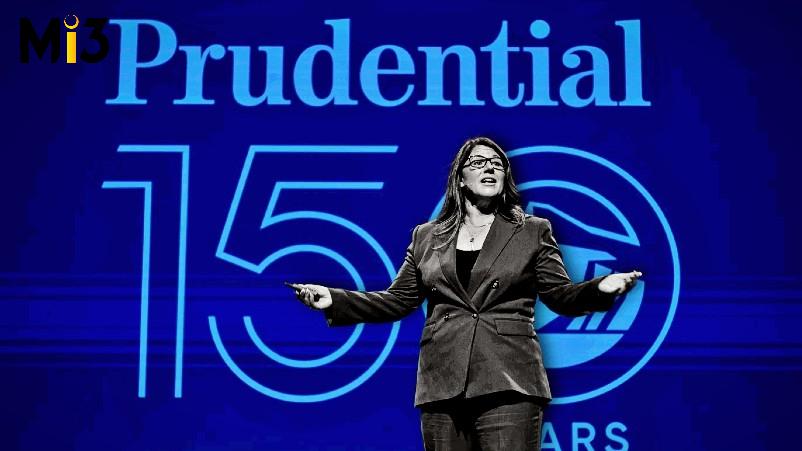Forrester has released its Global Total Experience Score Rankings for 2025, evaluating over 400 brands across 10 industries and 13 countries. Tesla has emerged as a leader in customer experience, achieving a score of 72.5 points. This score surpasses the industry benchmark and outperforms other automotive brands such as Honda, Toyota, and Volvo.
Author: admin
‘We had those cuts, now we are hiring back creatives’: Prudential’s brand, creative VP on crucial AI lessons, 18 months in – and the mistakes to avoid
Prudential’s story of adopting AI to improve brand creative and the content supply chain approach came from a place many marketing teams will be familiar with: How to do more than less while retaining brand consistency and strategic effectiveness. The results, 18 months in, show it’s working, with nine in 10 marketers gaining back 25 per cent of their time thanks to AI adoption. But VP of brand and creative, Bridget Esposito, doesn’t want leaders and companies to believe in the “misleading, terrible” narrative or the “magic marketing” underpinned by the idea people can simply be replaced by AI. That’s unrealistic, she says, and it’s detrimental to getting teams to experiment and invest their time in AI learning. Instead, Esposito is claiming she’s actually increasing creative headcount as the quality of content and what the creative team does improves thanks to more strategic adoption of AI for the short and long.
‘People’s jobs will be changed’: Salesforce global CMO on how AI agents are the new digital labour force, rapidly reshaping marketing; plus the ‘false precision’ of brand attribution
It’s less than a year since Salesforce launched autonomous AI agents into the wild. But the bots are already reshaping business functions. In the US, online accounting platform 1-800 Accountants, which handles payroll and book keeping for circa 100,000 firms, has slashed the time staff spend on customer service by 70 per cent. Open Table and Singapore Air are deploying the agents to similar effect. But what are they doing with all that freed human capital? And what are the broader implications for everyone as ‘agentics’ move rapidly through the digital supply chain? Salesforce global CMO Ariel Kelman and colleagues say we will all soon have our own agentics buying – and negotiating prices – for us in online shopping and services. Which has significant implications for business structures and marketing functions and capability in particular. Kelman says we are now looking at a step change in marketing automation beyond content, where the agentic labour force will generate campaign briefs, launch campaigns off those briefs, and self-optimise the creative messaging and channels to deliver on the brief it crafted in the first place. Outside of agentics, Kelman says Salesforce’s new multi-touch attribution model is powering, telling the firm which marketing investments are driving sales and how cost-efficient they are. But not for brand – Kelman thinks it’s pointless trying to attach a dollar value to brand investments in B2B. “It’s just so disconnected from the purchase.” Those attempting to do so, he suggests, are “operating at a false level of precision.”
‘People’s jobs will be changed’: Salesforce global CMO on how AI agents are the new digital labour force rapidly reshaping customer service, marketing and commerce; plus the ‘false precision’ of brand attribution
It’s less than a year since Salesforce launched autonomous AI agents into the wild. But the bots are already reshaping business functions. In the US, online accounting platform 1-800 Accountants, which handles payroll and book keeping for circa 100,000 firms, has slashed the time staff spend on customer service by 70 per cent. Open Table and Singapore Air are deploying the agents to similar effect. But what are they doing with all that freed human capital? And what are the broader implications for everyone as ‘agentics’ move rapidly through the digital supply chain?Salesforce global CMO Ariel Kelman and his say we will all soon have our own agentics buying – and negotiating prices – for us in online shopping and services. Which has significant implications for business structures and marketing functions and capability in particular. Kelman says we are now looking at a step change in marketing automation beyond content, where the agentic labour force will generate campaign briefs, launch campaigns off those briefs, and self-optimise the creative messaging and channels to deliver on the brief it crafted in the first place.Outside of agentics, Kelman says Salesforce’s new multi-touch attribution model is powering, telling the firm which marketing investments are driving sales and how cost-efficient they are. But not for brand – Kelman thinks it’s pointless trying to attach a dollar value to brand investments in B2B. “It’s just so disconnected from the purchase.” Those attempting to do so, he suggests, are “operating at a false level of precision.”
KFC Australia covers rent for young Australians in Christmas in July campaign
KFC Australia has launch a new Christmas in July promotion addressing the financial pressures faced by young Australians living at home. As part of the campaign, the fast-food giant will cover a year’s rent for four Australians.
The CMO Awards Podcast Ep7: Winners and finalists part 2: Uber, Guzman y Gomez CMOs reveal what makes their distinct marketing approaches effective
Their remits and responsibilities seem poles apart, but Guzman y Gomez global CMO, Lara Thom, and Uber CMO APAC, Andy Morley share strikingly similar views on the importance of culture, CMOs aligning personally to company values, brand-led strategy, and bold, progressive marketing that grabs attention and strikes the right cultural chord. It’s surprising really. Thom has her hands full with near-term growth, global expansion of a brand still challenging the QSR status quo and a recent IPO. Morley meanwhile, has his sights set on the longer-term brand horizon and reframing two mature businesses for what’s next. These very different marketing operators were in the studio for the latest CMO Awards winners podcast episode after being unilaterally recognised by judges for demonstrating marketing effectiveness in spades. Morley came in #6th in this year’s CMOs of the Year rankings (the highest ranked male this year, both joked), while Thom was the inaugural CMO Awards #1. The dynamic, sometimes combative but respectful conversation centres around what it takes to make marketing effective, drawing from Thom and Morley’s winning CMO Awards submissions plus career learnings. What both also share is a very timely reminder that the role of marketing has to adapt if it’s to achieve the same outcome every CMO is ultimately looking for: Delivering growth and market share through effective marketing. Both firmly hold themselves to commercial account. “At some stage, marketers got hold of a whole bunch of metrics and were able to kind of put some twinkly stars in the sky and go and say, Look, reach impressions, brand awareness graphs that don’t mean anything,” Thom says. “But the real accountability and the real effectiveness of an awesome and great marketer is actually in sales.”That by no means impinges brand and creative aspirations. “I’ve always said and believed that you can build brand and revenue at the same time,” Thom continues. “Anyone that says this is a brand campaign that’s not designed to drive sales, is wrong and lying, and it’s not working. All brand campaigns should elevate brand awareness, and that equates to sales. End of.”How marketers maintain an offensive, not defensive, position is another priority for both CMOs. “There are a number of brands that have more restaurants than us, so we’re still in an offensive position, where that hunger and we’re striving to get there,” Thom says. By contrast, Morley and the Uber team are in a very different space where the business is now well established, and in a market leadership position looking at what is next. It’s come after three years of successful work to transform and evolve what Uber Eats brand stands for and the power of its ‘Order almost anything’ brand positioning and creative platform. Morley is now thinking about Uber’s core rideshare business and where it goes next. “I think the reframing of what your category is, is the most important thing for our position,” Morley says. “We’re not just trying to maintain our share or just defend what we’ve got within rideshare or through delivery. We’re saying actually, what’s the bigger picture that we can go on? In the mobility space, it’s the private car. We are going harder on how we build more use cases away from the private car. It’s generally better for the consumer’s wallet, and that is a much bigger fish for us to go after.”
DoubleVerify expands attention measurement to Snapchat in social media first
DoubleVerify (DV) has introduced its new product, DV Authentic Attention for Social, on Snapchat. This launch marks the first instance of DV’s attention measurement capabilities being applied to a social media platform, expanding from its previous focus on the open web and connected TV (CTV).
ACCC takes Banana Boat, Hawaiian Tropic parent to court over alleged ‘reef friendly’ greenwashing claims
The Australian Competition and Consumer Commission (ACCC) has initiated Federal Court proceedings against Edgewell Personal Care Australia Pty Ltd and its parent company, Edgewell Personal Care Company, over allegations that the companies made false or misleading claims regarding the ‘reef friendly’ nature of their Hawaiian Tropic and Banana Boat sunscreen products.
ACAM’s AI readiness report reveals Australian marketing teams lagging in AI maturity
The Australian Centre for AI in Marketing (ACAM) has released its inaugural AI Readiness Benchmarking Report, categorising 52% of Australian marketing teams as Beginners in AI readiness, indicating interest in the tech but limited implementation.
Treasury Wine Estates unveils ‘Treasury Collective’ as new global premium division and brand
Treasury Wine Estates (TWE) has established a new global premium division named ‘Treasury Collective’ complete with branding and highly experienced leader, Angus Lilley.










